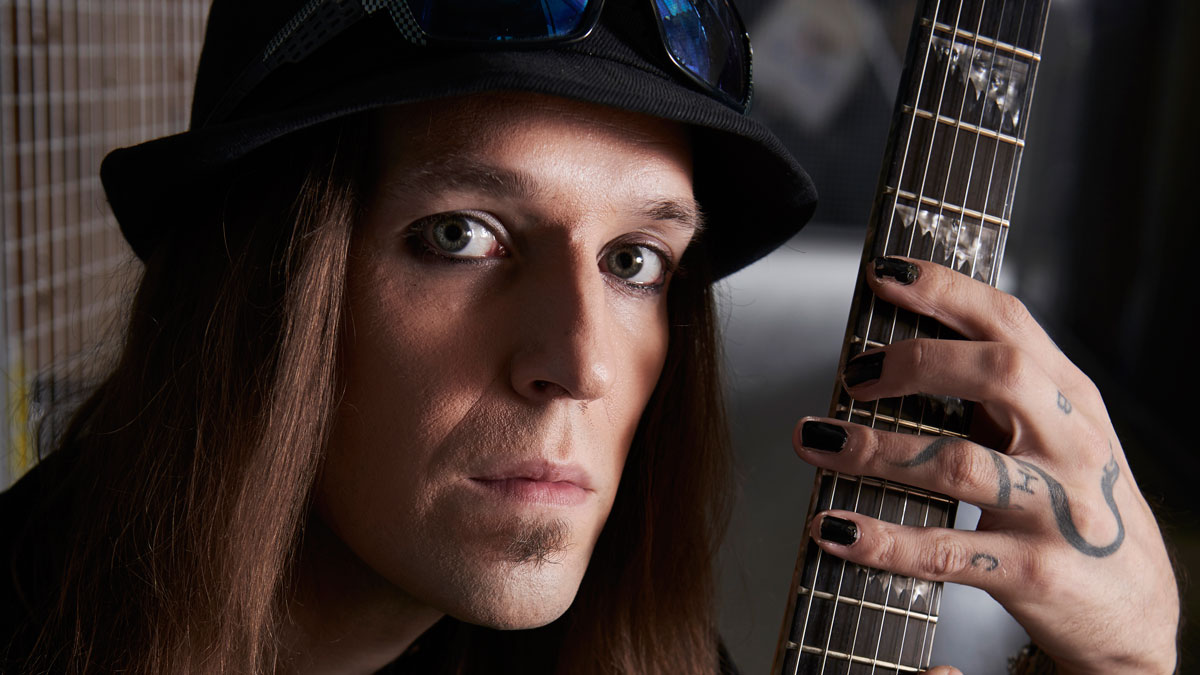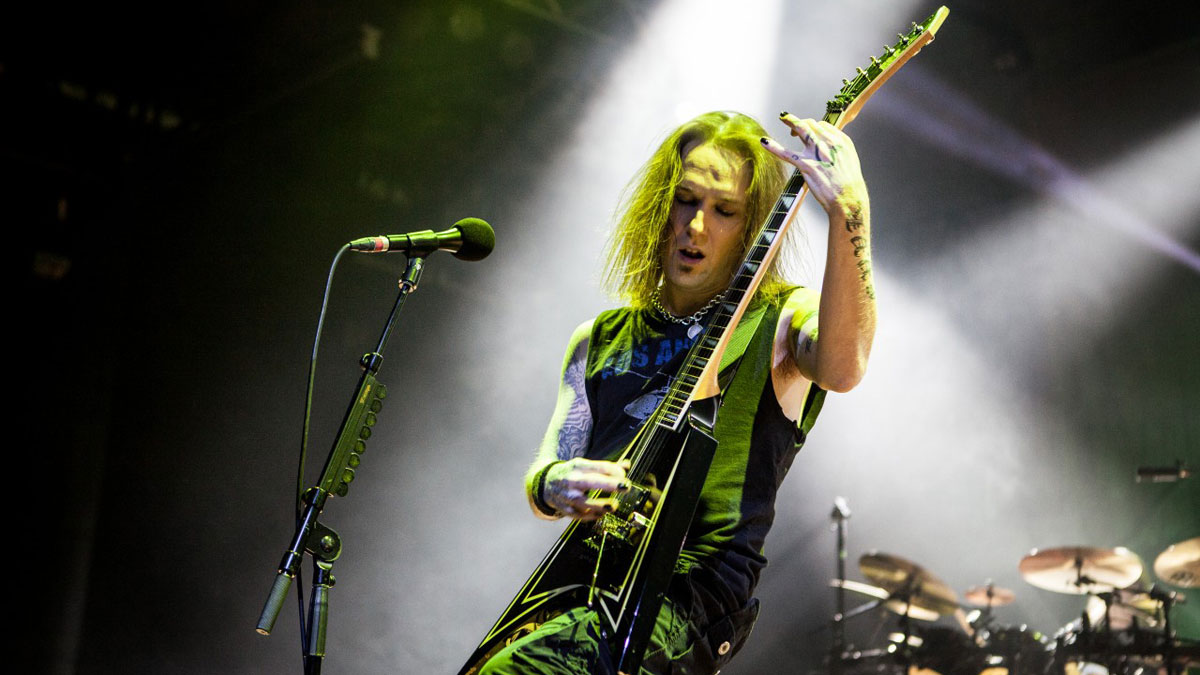Alexi Laiho’s top 5 tips for guitarists: "The metronome is a relentless tool. It won’t give you a break if your fingers start to hurt"
Children Of Bodom’s shredmaster general on the importance of practising and being open to pop

During the recording sessions for Hexed, Children Of Bodom’s 10th studio album, it was very much business as usual for singer/guitarist Alexi Laiho.
“There’s no news as far as gear goes - it’s exactly the same equipment I’ve been using since [2013’s] Halo Of Blood,” he tells MusicRadar, calling from “somewhere in the States, Nebraska or some shit.”
There are his signature ESP electric guitars, his trusty Marshall JVM head and simply no need for anything else, save for “this chorus that’s on non-stop to give me that 80s sound” and “the Kirk Hammett Cry Baby, which has more high-end.”
One aspect that was different this time round, however, was working as a five-piece - co-guitarist Daniel Freyberg having joined after last album I Worship Chaos.
Though he welcomed new ideas and was open to suggestions, Laiho admits he kept a tight rein on their creative pursuits - something which, to be fair, their leader has done since forming the band in 1993…
“I tend to write everything in terms of the music to lyrics,” he says. “But, you know, me and Daniel would jam and sometimes he’d throw in a small lick here and there or suggest trying something differently. And that was cool, I like that in a guitar player… I like that proactive approach, new ideas for trying things out. He’s a cool guy, we had a lot of fun together doing this record.”
Work ethic is important - being in this band requires people who are hard workers and listen to what the f**k I’m saying
What else does Children Of Bodom require from a guitar player, we wonder…
Get the MusicRadar Newsletter
Want all the hottest music and gear news, reviews, deals, features and more, direct to your inbox? Sign up here.
“Work ethic is important - being in this band requires people who are hard workers and listen to what the fuck I’m saying,” Laiho half-jokingly reveals, before explaining that same discipline and dedication is expected on all fronts - from himself perhaps most of all.
Though ‘Wildchild’ was a nickname he earned himself during the band’s alcohol-fuelled formative years, it’s not a lifestyle he prescribes to anymore…
“Hey, I have to work hard, too - on the road, I stick to the colas,” continues Laiho, stressing the music must always come first.
“I used to be a bit of a party animal, but honestly, I don’t want to be hungover on stage ever again. Back at home, sure, I still like getting fucked up once in a while, though I don’t go on benders or anything… I definitely won’t do two days in a row.”
Here the Finnish maestro gives his five tips for guitarists…
1. Focus on your picking hand first
The metronome should be your best friend. To become an advanced guitarist, you need to go through all the boring stuff
“First of all, forget about the left hand for a while. Work on your right hand - and I know it’s boring as hell, but the metronome should be your best friend. To become an advanced guitarist, you need to go through all the boring stuff before you are at a level where you can even try to attempt the riffs or leads that all the shredder guys are known for.
“Start with the basic scales and start slow. The second you notice it’s starting to sound scratchy or you feel you can’t keep up any more, dial it back and try again. It’s a slow and painful process… but it’s ultimately worth it.
“I find two-string picking things are good for this. For example, try playing the E minor pentatonic notes on just the high E and B strings up and down the neck. If you start slow, you can eventually go up to any tempo you want… if you put the time in. For any musician, the more you practice, the gnarlier you get.”
2. Learn some classical theory
“I learned the theory in music school as a kid, starting out on violin at around the age of seven. The left hand side of it is quite similar, the right hand is a whole different sport entirely. I think it definitely made playing guitar easier for me; it must have helped. Some of the classical composers like Paganini were crazy… it’s good music to challenge your ears as a guitar player.
“I might use some classical theory here and there, like playing the E harmonic minor scale notes - E, F#, G, A, B, C, D#, E - as I ascend and then switch to melodic minor - E, D#, C#, B, A, G, F#, E - on the way back down. That’s a good little trick to chuck in; that major sixth in place of the minor gives you an almost Vivaldi kinda flavour. You can try it either way.”

3. There’s no such thing as completing guitar
“You can never know everything; there’s always more to practice and more to discover. There are so many chords out there to learn - it’s insane trying to remember them all so it’s good to keep going back to them.
“At the end of the day, the metronome is a relentless tool. It won’t give you a break if your fingers start to hurt. It should be important for the rest of your life. I still continue to practise even to this day. Before a show, I’ll be there warming up - usually running through the harder licks with a metronome on.”
4. Add to your pentatonic scales
“One thing I like to do with the pentatonic scale is throw in extra notes like the major third or major sixth, which can give you a really good, almost jazzy flavour. When you do it really fast, it’s kinda hard to notice there are major scale notes hiding in there. That said, I don’t use major sixths in chords. I might use the minor sixth, but even then it doesn’t really tend to pop out that much.

“I have been playing more three-note-per-string pentatonics recently, too… it sounds different to your basic pentatonics. It’s a good scale to experiment with, which is cool. For the more outside scales like diminished or whole tone, you need to fiddle around with things and figure out where you can use them and where you can’t.
“Music theory is great for knowing where you can apply the diminished stuff. The whole tone, however, is pure madness… you can throw it in anywhere and things will sound crazy!”
5. Listen to everything
“Great music is everywhere and can be found in the places you’d least expect. We covered Britney Spears once! I enjoy annoying pop songs. If I hear Avril Lavigne on the radio, I can actually take some sort of inspiration from her music. Things that aren’t heavy metal can still serve a purpose…
“So keeping an open mind with music is important. Don’t just confine yourself to metal. There’s so much amazing stuff out there - it might be pop music or something you’d wouldn’t necessarily tell your friends about, but give it a try. You might actually learn something and end up coming out with amazing riffs in your own projects.”
Hexed is out now via Nuclear Blast.
Amit has been writing for titles like Total Guitar, MusicRadar and Guitar World for over a decade and counts Richie Kotzen, Guthrie Govan and Jeff Beck among his primary influences. He's interviewed everyone from Ozzy Osbourne and Lemmy to Slash and Jimmy Page, and once even traded solos with a member of Slayer on a track released internationally. As a session guitarist, he's played alongside members of Judas Priest and Uriah Heep in London ensemble Metalworks, as well as handling lead guitars for legends like Glen Matlock (Sex Pistols, The Faces) and Stu Hamm (Steve Vai, Joe Satriani, G3).




![PRS Archon Classic and Mark Tremonti MT 15 v2: the newly redesigned tube amps offer a host of new features and tones, with the Alter Bridge guitarist's new lunchbox head [right] featuring the Overdrive channel from his MT 100 head, and there's a half-power switch, too.](https://cdn.mos.cms.futurecdn.net/FD37q5pRLCQDhCpT8y94Zi.jpg)





